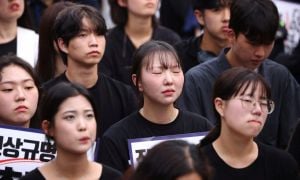Improving housing conditions for military personnel and citizens has become a notable focus for the Russian government, especially following recent announcements from regional authorities.
Governor Alexander Drozdenko of the Leningrad region has made strides toward assisting military service members and their families who are deemed eligible for improved housing conditions. "If they are recognized as needing improved housing conditions, the region will help them. Family income levels will not affect eligibility for the subsidy," Drozdenko stated via his Telegram channel.
Among other measures, he has requested the Russian government to look at introducing preferential mortgage schemes for these service members. There are additional directives aimed at enhancing the processes for land allotments and working with forest tenants to secure affordable timber for the construction of homes for returning soldiers.
The commitment to resolving housing issues for military participants has faced typical bureaucratic challenges but is spurred by the significant needs articulated by these individuals. Indeed, the general population reflects similar sentiments about upgrading living conditions, underlined by survey results shared by the company Rokvul.
Analysts at Rokvul revealed compelling statistics about the residential aspirations of the people. Findings indicated, "Two-thirds of Russians plan to change their housing conditions this year," signaling a noteworthy shift toward improving personal living situations. Specifically, among respondents, 22% plan to either build or purchase ready-made houses, and another 7% aspire to buy apartments. On the other hand, about 35% are inclined to undertake repairs.
This intention to improve residences contrasts with prior years' data. There was observed growth—up 9% from last year—in those eager to change their circumstances. Interestingly though, the figures show a downturn, with 3% fewer intending to invest in new property, as indicated by the survey results from Rokvul.
Homeownership appears more desirable compared to apartment living. The segment of people interested in building or buying individual houses (as opposed to apartments) remains stable, with 14% showing intent for new constructions, compared to just 7% for apartment purchases.
This burgeoning trend toward individual housing and renovation underlies several driving factors: accessible governmental programs, expansive transportation and utility infrastructure, and the freedom inherent with choosing designs and layouts. Observing past metrics, 58% of developed residential properties were individual housing, accounting for 62 million square meters - the highest amount recorded for the country.
Conversely, these aspirations come with pressing economic uncertainties. Many citizens are cautious about their financial commitments amid fears of substantial expenditures and project delays. Notably, 73% of survey respondents expressed concerns over these potential costs, compounded by the instability often encountered during construction processes.
Particularly alarmed respondents (42%) indicated worries over potentially substandard construction materials or counterfeit products. Quality assurance remains another red flag, cited by 34% of those surveyed, alongside concerns about poor work execution on their renovations.
The repercussions of relying on inferior construction materials can be dire, as highlighted by ROKVUL's sales director, Roman Kartashev. "Unfortunately, the construction material market does see counterfeits, with hazards especially posing threats where fire safety regulations are overlooked. Unscrupulous manufacturers may present one product for testing, only to deliver another to consumers, often with inconsistent, even false, testing outcomes,” he warned.
Economic conditions and rising prices within urban real estate development have intensified the competition and heightened expectations for living spaces, pushing many citizens to rethink their strategies either to acquire new homes or renovate existing ones.
Beyond military service members, it appears the state is bolstering its support for citizens at large as it embarks on initiatives collaboratively intended to alleviate the pressures surrounding housing needs. By integrating the assistance for military families alongside public aspirations, officials are taking multi-dimensional approaches toward addressing widespread housing concerns.
Governor Drozdenko’s endeavors reflect not only localized efforts but also mirror larger initiatives on addressing housing conditions across Russia, driven by the voiced needs of returning service members and citizens alike. This multifaceted push supplies needed recognition to the substantial challenges related to housing and symbolizes the drive from regional governance to engage more broadly with constituents’ concerns.
Improving housing conditions is now woven deeply within the broader narrative of regional development, military support, and economic assurance, offering hope for many as they strive toward realizing safer, more secure living environments.



